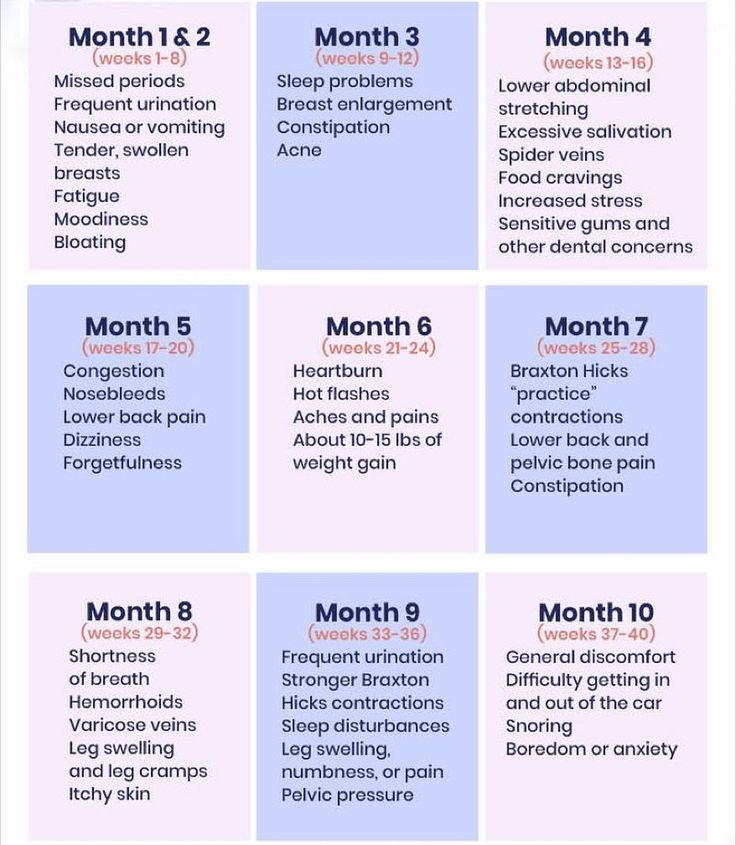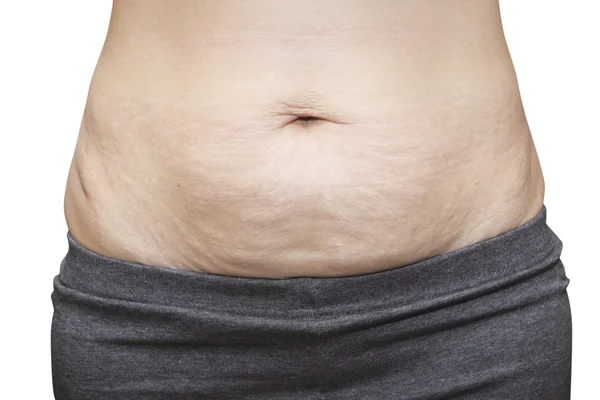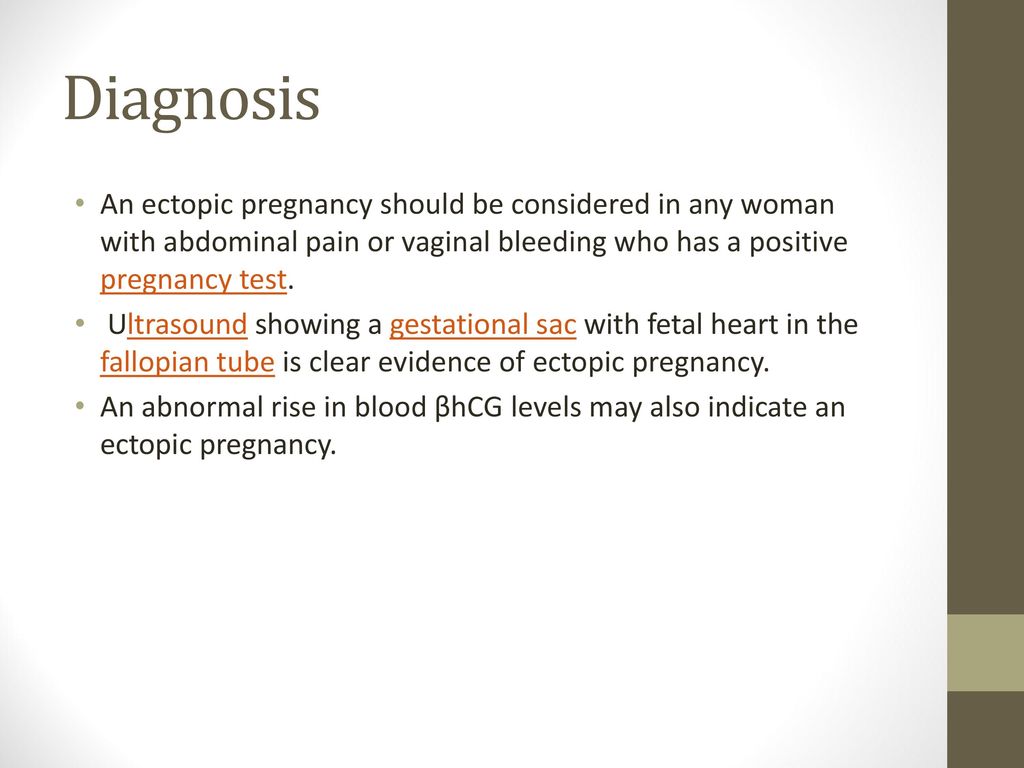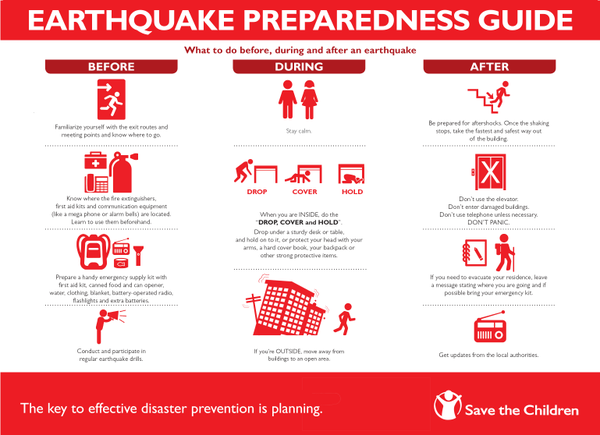How to avoid hemorrhoids during pregnancy
Hemorrhoids During Pregnancy: Causes and Prevention
Hemorrhoids — swollen veins in the anus and rectum — are common during pregnancy, especially in the third trimester when the enlarged uterus puts pressure on the veins.
Hemorrhoids can be painful. They may also itch, sting, or bleed, especially during or after a bowel movement.
While your body is going through all sorts of physical changes during pregnancy, hemorrhoids can be one more unwanted irritation. But the good news is that they generally aren’t harmful to your health or the health of your baby, and they’re usually a short-term problem. Though pushing during labor can worsen hemorrhoids, they typically go away on their own after you give birth. (1)
Some women get hemorrhoids for the first time when they’re pregnant. But if you’ve had hemorrhoids before, you’re more likely to get them again when you’re pregnant.
What Can Cause Hemorrhoids During Pregnancy
As your unborn baby grows, your uterus gets bigger and begins to press against your pelvis. This growth puts a lot of pressure on the veins near your anus and rectum, and these veins may become swollen and painful as a result.
The increase in the hormone progesterone during pregnancy can also contribute to the development of hemorrhoids, as it relaxes the walls of your veins, making them more prone to swelling. An increase in blood volume, which enlarges veins, can also contribute to hemorrhoids during pregnancy. (1)
Three common additional causes of hemorrhoids during pregnancy include:
- Straining during bowel movements
- Straining from carrying extra pregnancy weight
- Sitting or standing for long periods of time
Hemorrhoids are most common in pregnant women who experience constipation.
As many as 38 percent of pregnant women become constipated at some point during their pregnancy, according to research published in the journal BMJ Clinical Evidence. (2)
One cause of constipation during pregnancy may be when the growing uterus pushes against the bowel.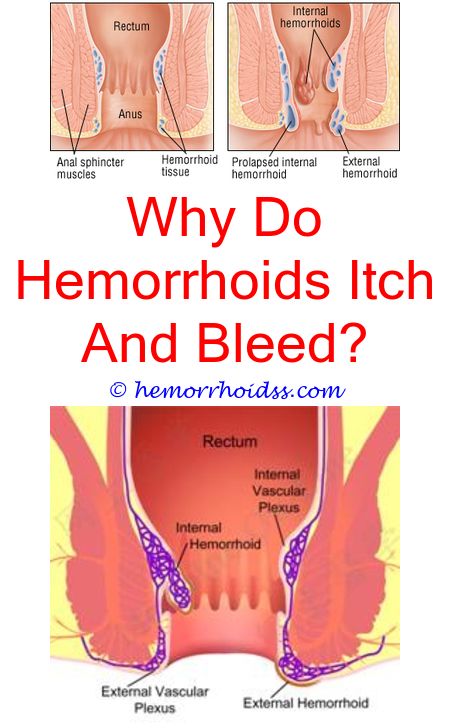 Iron supplements you may take can also contribute to constipation, so it’s worth trying to get the iron you need naturally through your diet. (3)
Iron supplements you may take can also contribute to constipation, so it’s worth trying to get the iron you need naturally through your diet. (3)
Pregnancy hormones can also slow down the movement of food through the digestive tract, making constipation more likely.
How to Prevent Hemorrhoids During Pregnancy
Avoiding constipation is key to preventing hemorrhoids during pregnancy. Here are some tips for preventing constipation:
Eat lots of high-fiber foods. There are plenty of good ways to incorporate more fiber into your diet. Fiber-filled foods include fruits like pears (especially when you include the skin), avocados, and berries; vegetables such as broccoli, artichokes, and Brussels sprouts; whole grains such as oatmeal, brown rice, quinoa, and even popcorn; legumes including various kinds of beans, lentils, and green peas; and don’t forget nuts and seeds.
RELATED: 11 High-Fiber Foods to Add to Your Diet
Drink plenty of fluids.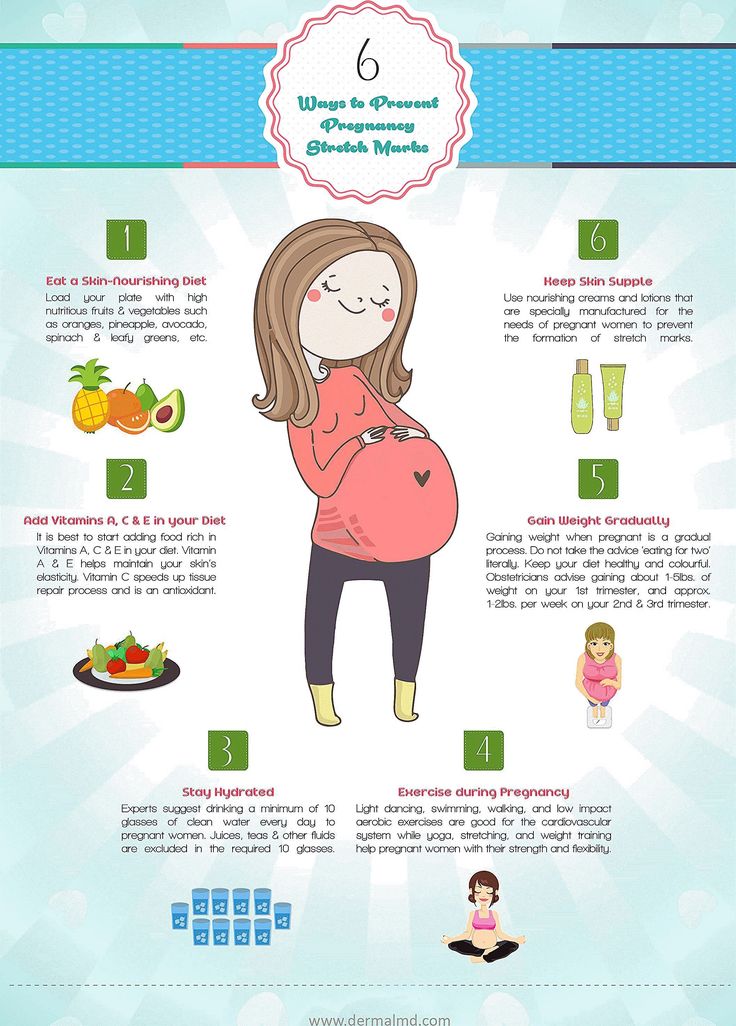 Aim for 10 8-ounce glasses of water each day.
Aim for 10 8-ounce glasses of water each day.
Use the toilet as soon as you feel the urge. “Holding it in” can contribute to constipation.
Try not to sit or stand for long periods of time. If you sit down at work, make sure to get up and walk around for a few minutes every hour. At home, try to rest on your side when reading or watching TV, to relieve downward pressure on your rectal veins.
Ask your doctor about using a stool softener. This can help if other methods fail to ease your constipation. Using laxative pills for constipation is not recommended during pregnancy, as they can cause dehydration and might stimulate uterine contractions. (3)
Do Kegel exercises daily. Kegel exercises strengthen the pelvic floor muscles that help support your rectum and can improve circulation in the rectal area. You can do Kegel exercises just about anywhere — at home, in your car, at the office — but first you need to make sure you’re isolating and contracting the correct muscles.
Identify the right muscles by stopping urination midstream. (This is strictly for the purpose of identifying which muscles we’re talking about — you don’t want to do Kegels while urinating, as this could increase your risk for a urinary tract infection). (4)
Once you know which muscles to use, tighten them and hold the contraction for five seconds. Then relax for five seconds. Work up to holding the contraction for 10 seconds. Try to do at least three sets of 10 reps a day.
RELATED: 10 Foods to Help Relieve Constipation
RELATED: Constipation Causes, Symptoms, and Relief
How to Treat Hemorrhoids During Pregnancy
Hemorrhoids usually get better on their own after pregnancy, but there are a number of things you can do to ease any itching and pain in the meantime:
Soak your rectal area in warm water several times a day. A sitz bath, or small basin that fits over the toilet seat, can help.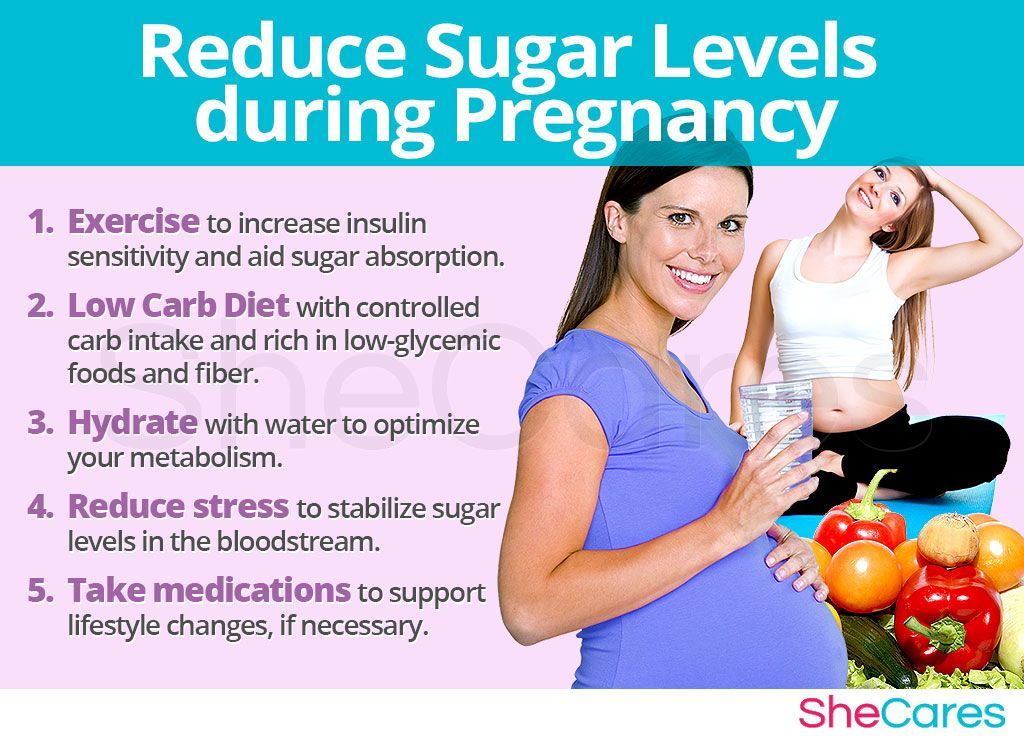 These devices can be purchased at most drug stores. You can also fill your regular bathtub with a few inches of warm water to create a similar effect.
These devices can be purchased at most drug stores. You can also fill your regular bathtub with a few inches of warm water to create a similar effect.
Apply ice packs or cold compresses to the area several times a day. The cold can reduce swelling and help relieve pain.
Keep the anus clean and dry. Try using moist towelettes or baby wipes to gently clean the area after bowel movements. This can be more gentle than dry toilet paper.
Be sure to pat — not wipe — the area dry after bathing or making a bowel movement. Excess moisture can cause irritation.
Apply baking soda (wet or dry) to the area to alleviate itching. (3)
Apply treatments containing witch hazel. Products like Tucks Medicated Cooling Pads can help keep the area clean and relieve pain and itching around the anus.
But before you use any products, be sure to ask your doctor or healthcare provider to recommend a topical hemorrhoid cream or medicated wipe that’s safe to take during your pregnancy.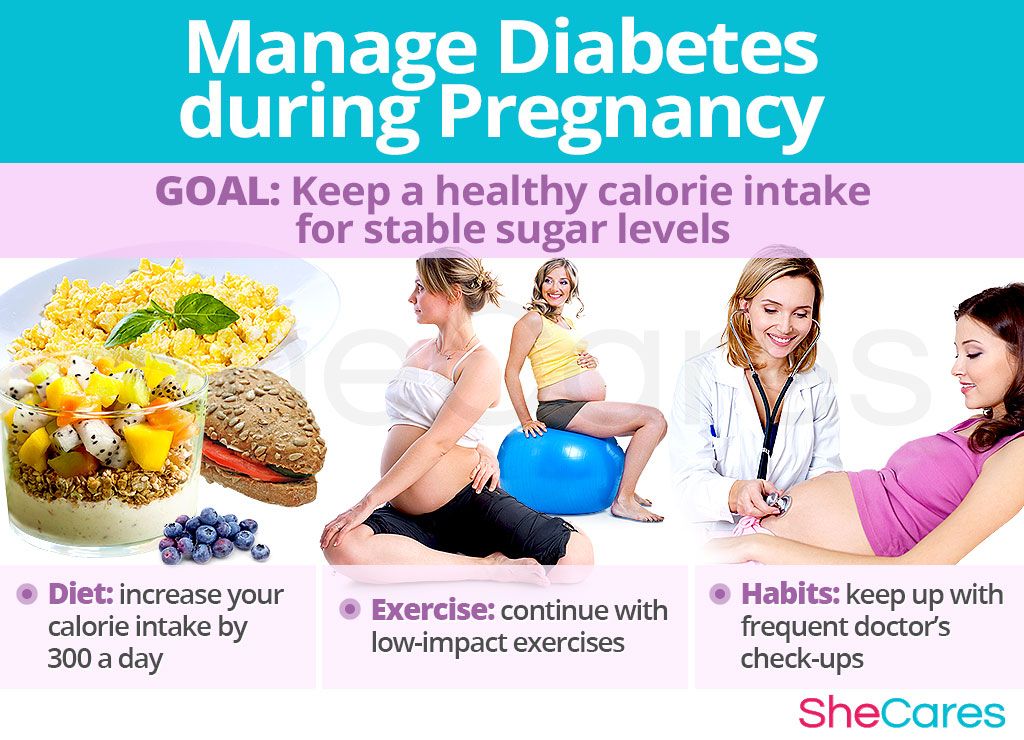
Additional reporting by Deborah Shapiro.
What Is a Gastroenterologist and What Do They Treat?
By Julie Lynn MarksHow to Jump-Start Your Digestion After You Quit Nicotine
By Monroe HammondWhat Is Appendicitis? Symptoms, Causes, Diagnosis, Treatment, and Prevention
By Joseph Bennington-CastroWhen to See a Doctor About Hemorrhoids
Often the cause of discomfort, hemorrhoids are rarely dangerous. Here’s what you need to know if symptoms like pain and rectal bleeding occur.
By Ashley Welch
What Are Hemorrhoids? Symptoms, Causes, Diagnosis, Treatment, and Prevention
By Lindsey KonkelTreatment for Hemorrhoids
Most hemorrhoids can be treated at home or with simple medical procedures.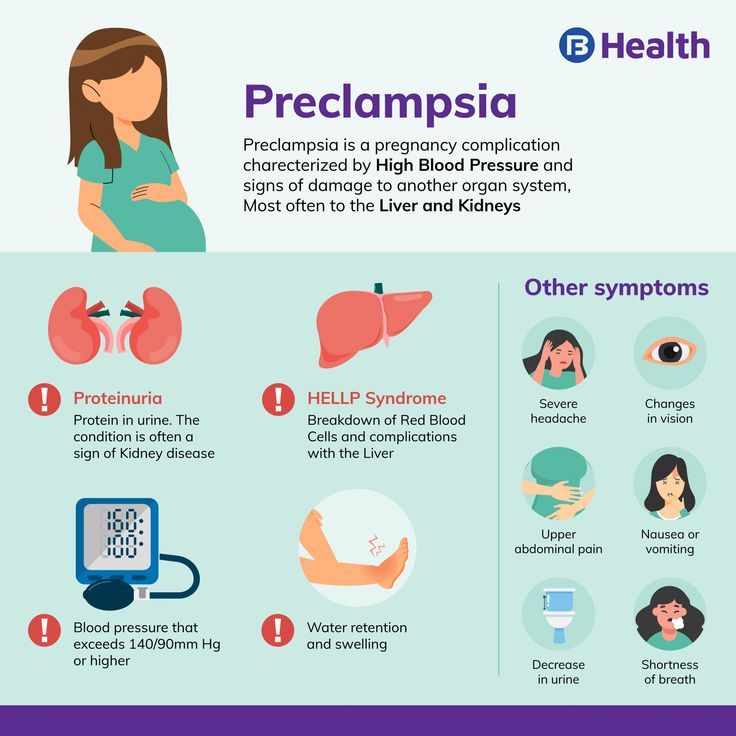
By Lindsey Konkel
8 Myths You’ve Been Told About Hemorrhoids
By Mikel TheobaldDealing with hemorrhoids during pregnancy
Hemorrhoids can also result from constipation since pregnancy hormones cause your bowels slow down. When stool is hard, the extra straining to eliminate it can put pressure on veins in your rectal area, causing them to become inflamed and bulge. "On top of that, higher progesterone levels cause the walls of the veins to relax and allow them to swell more easily," says Dr. Harris.
If you had hemorrhoids before pregnancy, you're more likely to have them during pregnancy. They can also develop postpartum because of pushing during labor.
How can you prevent hemorrhoids during pregnancy?
Your body undergoes a lot of changes when you're expecting, and swelling veins can be one of them.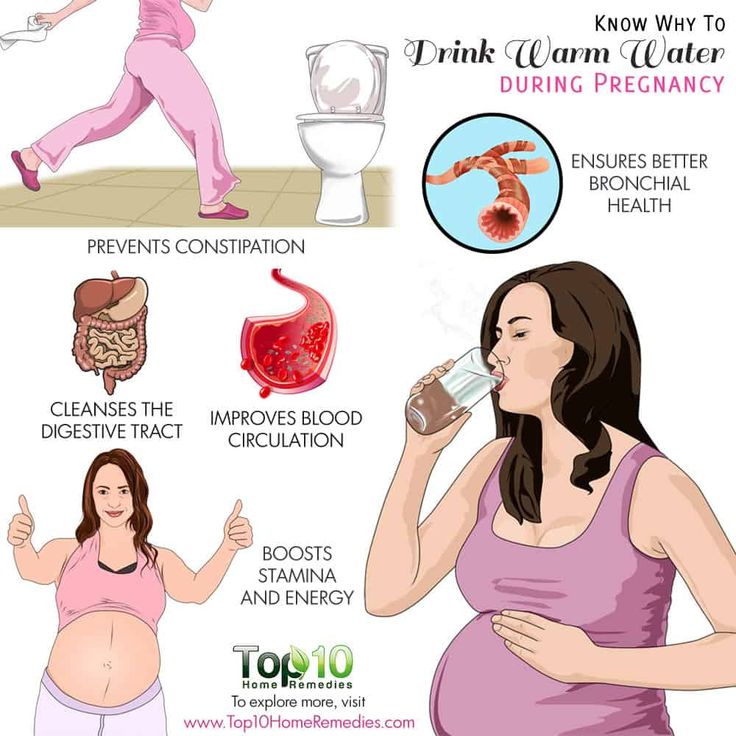 Talk to other expectant moms during prenatal classes, share experiences or ask your instructor about natural remedies.
Talk to other expectant moms during prenatal classes, share experiences or ask your instructor about natural remedies.
These steps may help you avoid hemorrhoids during pregnancy:
Avoid constipation
- Eat a high-fiber diet. Choose from fresh avocados, beans, and other fruits and vegetables.
- Don't delay going to the bathroom when you feel the urge. Make sure you don't sit on the toilet longer than necessary because this puts pressure on your rectal area.
- If you're already constipated, ask your healthcare provider about a fiber supplement or stool softener.
- Choose a food-based prenatal vitamin. Synthetic vitamins, especially iron, can cause constipation. Food-based prenatal vitamins are more absorbable.
Keep moving
- Get regular (and safe) exercise right up to your due date — as long as your provider says it's OK.
- Do Kegel exercises. They increase circulation in the rectal area and strengthen the muscles around the anus.

- Don't sit or stand for long stretches of time. If your job involves sitting at a desk, get up and move around for a few minutes every hour or so.
Promote good habits
- Drink plenty of water and other fluids. If you aren't drinking enough, your body will reabsorb water through the colon, leaving dry stool that's hard to push out.
- Lie on your side when sleeping, reading or watching TV to take the pressure off your rectal veins.
- Try not to gain more than the recommended amount of weight because the more you gain, the more pressure on the rectum.
How can you treat symptoms during pregnancy?
If you experience symptoms, try one of these remedies:
- Cold therapy can help reduce swelling and bring temporary relief. Apply an ice pack (with a covering) to the affected area.
- Soak in warm water several times a day. If you don't have a bathtub, you can buy a sitz bath. After getting out of the tub, pat the area dry.
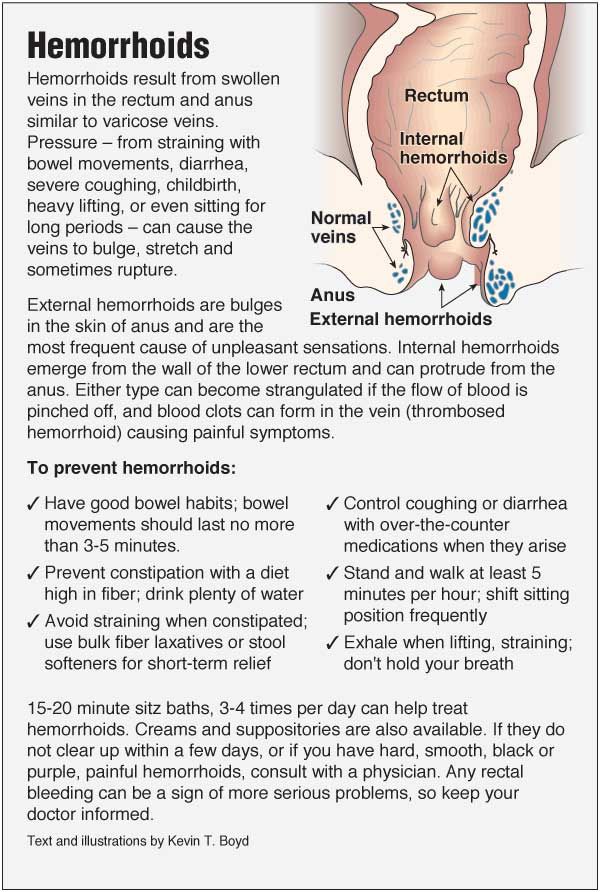
- If sitting is uncomfortable, get a donut-shaped pillow to ease the pressure.
- Apply witch hazel pads to the area and change the pads frequently. Witch hazel has a cooling effect and helps reduce swelling.
- Baking soda – used wet or dry – can be applied topically to help alleviate itching.
- Coconut oil can relieve pain and inflammation. So can pure aloe vera without added chemicals and fragrances, or arnica.
- Stay clean and use soft, unscented toilet tissue or unscented wipes to avoid more irritation in the affected area.
- Acupuncture can also help.
When should you see your healthcare provider?
Consult your provider if preventive efforts and home treatments don't help, or if you have severe pain or rectal bleeding. In some cases, you may need professional help shrink your hemorrhoids.
Also, always check with your provider before taking any medication for hemorrhoids while you're pregnant. There are a lot of hemorrhoid relief products available. Keep in mind that most of these products should be used for no more than a week to avoid such side effects as skin irritation or thinning.
There are a lot of hemorrhoid relief products available. Keep in mind that most of these products should be used for no more than a week to avoid such side effects as skin irritation or thinning.
For many women, hemorrhoid symptoms resolve after delivery. If they persist, surgical treatment might be recommended.
Hemorrhoids during pregnancy: can it be avoided?
About half of all pregnant women face such an unpleasant complication as hemorrhoids. The disease can make itself felt in any trimester of pregnancy, as well as after childbirth. The complexity of the situation lies in the fact that not all methods of treating hemorrhoids are suitable for pregnant women and nursing mothers. For this reason, experts focus on disease prevention.
What the statistics say
About 80% of the adult population of our country sooner or later faces hemorrhoids. Some people notice the disease in the early stages, others go to the doctor when the symptoms become pronounced.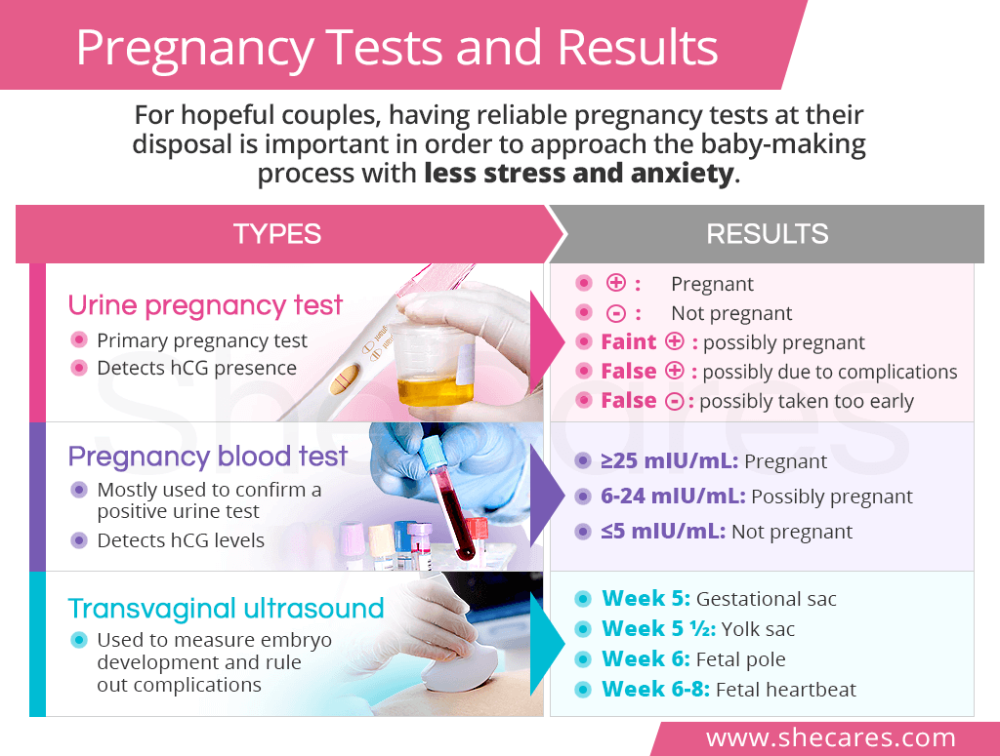 As for pregnant women, hemorrhoids are detected in the first trimester in 33% of cases, in the second trimester - in 35%, in the third trimester - up to 45%.
As for pregnant women, hemorrhoids are detected in the first trimester in 33% of cases, in the second trimester - in 35%, in the third trimester - up to 45%.
After childbirth, hemorrhoids are detected in every second woman, or rather in 49.8% of cases. It must be emphasized that these are official statistics. Some women do not notice the development of the disease, do not attach importance to the characteristic symptoms, or ignore them, deliberately not seeking medical help, so the numbers given may be higher in reality.
Why does hemorrhoids develop during pregnancy
It is known that a lot of changes occur in the body of a pregnant woman, ranging from increased hormonal activity to changes in the functioning of the main organs and systems. All these processes can contribute to the development of hemorrhoids, but doctors identify several more significant factors:
- Sedentary lifestyle, especially in late pregnancy.
- Increased intra-abdominal pressure due to an increase in the fetus and uterus in size.

- Decreased intestinal motility and, as a result, the development of constipation.
Compression of the inferior vena cava by an enlarged uterus with impaired blood outflow from the lower extremities and pelvic organs. The maximum increase in intra-abdominal pressure is noted at the time of labor, and the head of the child passing through the birth canal significantly compresses the vessels, up to the complete cessation of blood circulation in them. These changes are short-term, but they can still lead to the development of hemorrhoids during pregnancy or after childbirth.
Prophylactic features
Prevention usually involves a series of activities that eliminate or minimize exposure to predisposing factors. It is clear that it is impossible to stop the growth of the fetus and avoid an increase in intra-abdominal pressure during childbirth, but some actions can contribute to the prevention of hemorrhoids. Basic recommendations include:
- Motor activity.
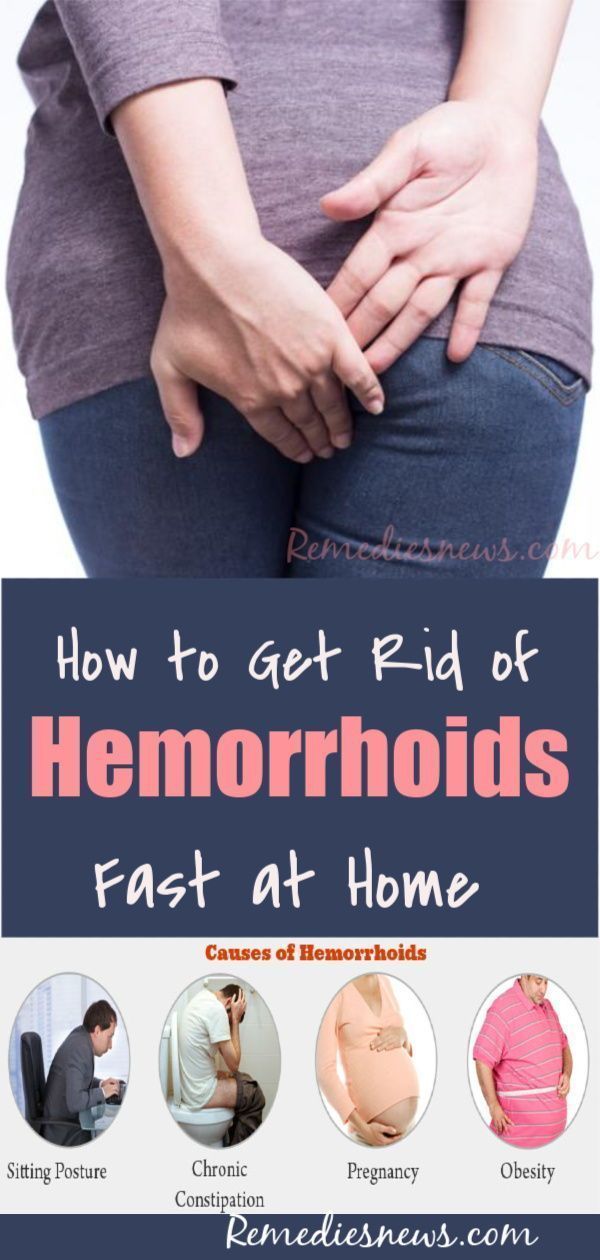 In order to avoid stagnation of blood in the small pelvis, it is necessary to walk daily, depending on the duration of pregnancy, perform physical activity (gymnastics, swimming pool), do yoga, etc.
In order to avoid stagnation of blood in the small pelvis, it is necessary to walk daily, depending on the duration of pregnancy, perform physical activity (gymnastics, swimming pool), do yoga, etc. - Proper nutrition. The presence in the diet of a sufficient amount of fiber, proteins, fats and carbohydrates, as well as the use of the required amount of ordinary water, will normalize intestinal motility and prevent the development of constipation.
- It is necessary to exclude situations that may be associated with an increase in intra-abdominal pressure. For example, it is recommended to avoid heavy lifting, and try not to push too hard when going to the toilet.
At the stage of pregnancy planning, it is necessary to undergo the most complete medical examination and consult with doctors, among whom should be a proctologist. It is mandatory to see a specialist if hemorrhoids have already been detected in the next of kin. It may turn out that the disease has already begun to develop and then it will be possible to eliminate its manifestations simply and quickly.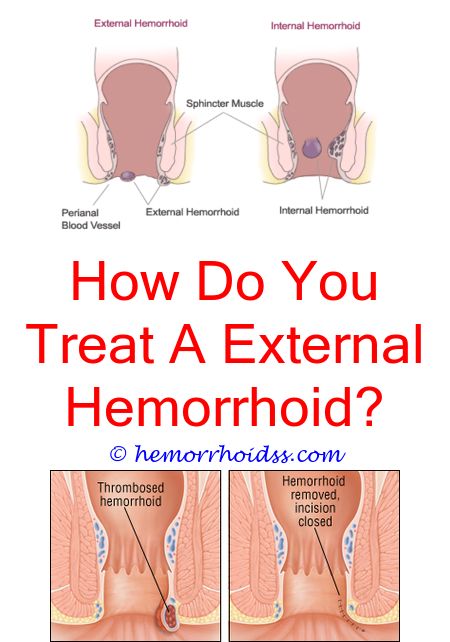
What to do if you develop hemorrhoids during pregnancy
The disease is not immediately accompanied by severe clinical symptoms, its initial manifestations often go unnoticed. Signs of hemorrhoids, such as discomfort and burning in the rectal area, a woman can attribute to pregnancy and not seek medical help. As a result, the disease progresses and leads to other serious complications that can significantly complicate the process of childbirth. Therefore, a pregnant woman should carefully monitor her health and contact a specialist with any changes. Hemorrhoids have long ceased to be a delicate problem that needs to be hidden and embarrassed to tell a doctor about it, the consequences that can affect both the health of the mother and the developing body of the child are much more dangerous.
Treatment of the disease is possible, tactics are always determined strictly individually. The doctor takes into account the degree of hemorrhoids, the duration of pregnancy, the individual characteristics of the woman. Sometimes the elimination of the disease can be delayed until the postpartum period, sometimes therapy can be prescribed immediately. In each case, it is necessary to listen to the opinion of the doctor and strictly follow all his recommendations.
Sometimes the elimination of the disease can be delayed until the postpartum period, sometimes therapy can be prescribed immediately. In each case, it is necessary to listen to the opinion of the doctor and strictly follow all his recommendations.
The material was prepared by
specialist of the medical center "URO-PRO"
Sugak Tatyana Vladimirovna,
proctologist, 12 years of experience
Back to the list of articles
Treatment of hemorrhoids during pregnancy | Articles of the medical center "SM-Clinic"
Hemorrhoids - a disease associated with inflammation and pathological expansion of the hemorrhoidal veins that form knots around the rectum. This is a very common disease, its cause is usually venous blood stagnation in the lower body and legs.
The development of hemorrhoids takes place gradually - in the initial stage, there is heaviness and itching in the anus, pain, constipation, later - bleeding, sagging and prolapse of elastic hemorrhoids.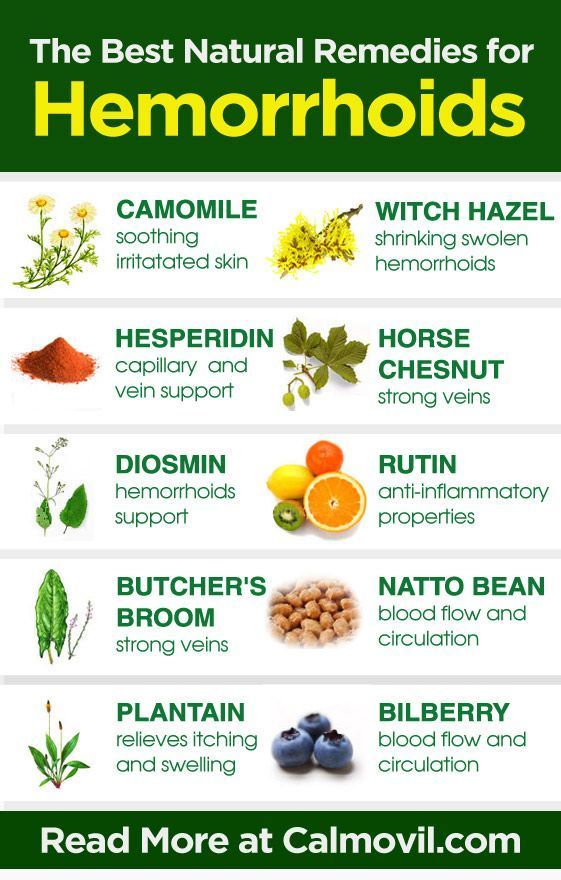
Factors that cause hemorrhoids are a sedentary lifestyle, unhealthy diet, obesity, alcohol abuse, cirrhosis of the liver of life.
This disease often accompanies pregnancy - about half of women who are expecting a child suffer from it. The main reasons for pregnant women are the pressure of the growing uterus on the lower abdomen, which compresses the veins, and constipation due to low intestinal motility.
In healthy women, hemorrhoids can develop in the second half of pregnancy, but if there is a hereditary predisposition, or the symptoms of hemorrhoids were manifested before pregnancy, then hemorrhoids can develop at an earlier date - already from the 12th week.
Symptoms of hemorrhoids during pregnancy
Hemorrhoids during pregnancy can occur in two forms:
- acute;
- chronic.
The acute form is characterized by the sudden formation of a blood clot in the veins of the rectum, which causes burning pain, especially after the defecation process. Dense external nodes are formed, the diameter of which can reach 2-3 cm, the skin under them swells and turns red.
Dense external nodes are formed, the diameter of which can reach 2-3 cm, the skin under them swells and turns red.
After 5-10 days, the acute form becomes chronic - the nodes soften and swell only when straining. The process is accompanied by discomfort in the anus and itching.
Blood appears in the fecal masses, sometimes in fairly large quantities, hemorrhoids can fall out of the anus, self-adjusting after some time. There may be no pain, there may be a feeling of incomplete emptying of the intestine, discomfort, bloating. Walking and sitting become painful.
Treatment of hemorrhoids during pregnancy
The main methods of treatment of non-acute hemorrhoids during pregnancy are strict adherence to diet and hygiene rules. The diet prescribed by a dietitian should help avoid constipation and regulate bowel movements - dried fruits, nuts, cereals, and sour-milk products are recommended for this. Spicy foods, rich products, strong tea should be excluded.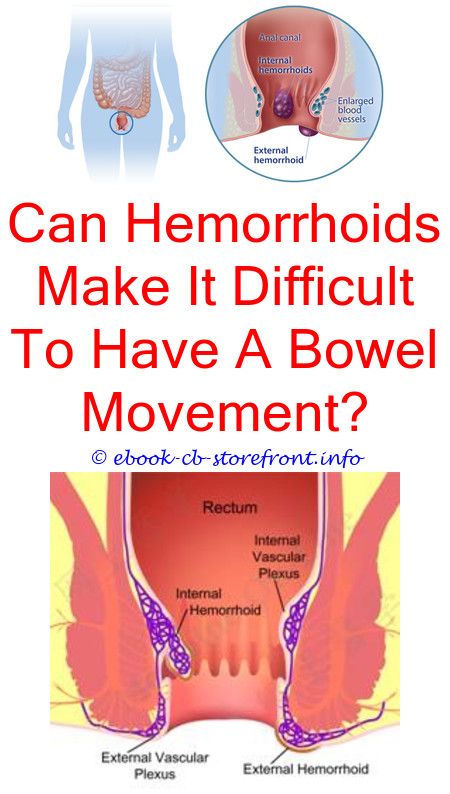
For hygiene procedures, it is recommended to use wet toilet paper, wash the anus after defecation. If external nodes occur, you can take baths with a weak solution of chamomile or potassium permanganate.
To reduce blood stasis, it is necessary to perform preventive gymnastics - its main exercises should be aimed at stimulating the muscles of the pelvis, anus and legs. In addition, it is necessary to adjust the daily routine - to take walks, combining them with moderate rest and sleep.
If these measures do not bring the desired result, it is possible to use medicines - suppositories, ointments, creams. However, it is worth remembering that any drug treatment must be agreed with the gynecologist - during pregnancy, self-medication and the use of drugs without a prescription is unacceptable.
If conservative treatment is ineffective, surgery may be required, but usually during gestation it is performed only in extreme cases, with careful monitoring of the proctologist and surgeon.